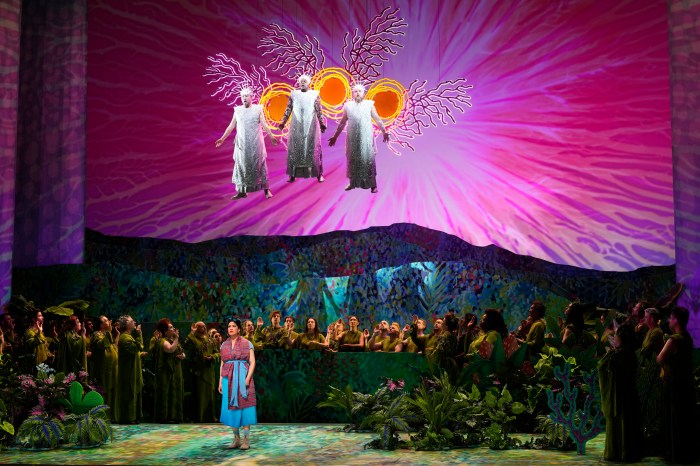Even for a band that is regularly in flux, Okkervil River’s latest album, “Away,” marks a major transition point. Leader Will Sheff recorded it with a new lineup that moves the band away from the indie-style folk-rock it is known for a toward a jazz and traditional folk-influenced sound. He began the album with a song entitled “Okkervil River R.I.P.,” one of several that focus on themes of death and rebirth. amNewYork spoke with Sheff.
You’ve talked about how you were going through a difficult period as you wrote these songs. What was on your mind?
There were a series of things happening in my life that were difficult for me, but without going into too much personal detail, I think that the main crisis I was dealing with was more of an inner, emotional issue than a reaction to any one thing happening in the external world. I think, on some level, I was questioning what I was doing on earth and why I was continuing to make music. I’ve been playing music as Okkervil River for coming on 20 years — it’s all I’ve done with my adult life.
I’ve seen a lot of my contemporaries hang it up as the music business falls apart and it gets more and more difficult to make a living, and those issues have affected me as well, and when that starts to happen you begin to question why you should keep going, when there’s more security to be found elsewhere and seemingly more important jobs that need to be done.
And I think I settled on this idea that artists are on the front lines of the battle to shape the soul of the human race, and that’s a very serious job — almost a calling, like the priesthood — and that, like the priesthood, I shouldn’t be surprised if no money was forthcoming, and that I also had a responsibility to follow my inner voice no matter what. Once I settled on that idea it was really clear what kind of record I wanted to make.
How did you change your writing style for this album?
Like a lot of artists, I think I’m always trying to refine and elevate what it is that I do and break through to what feels, for me, like a new level. It seems more and more, for me, that process has involved loosening up, opening up the language and the subject matter, trying to break my impulse to make things logical and to wrap things up, and to instead make my process feel more natural and intuitive and organic.
On “Away” that meant not worrying so much about what was a chorus and what was a verse, about what constituted a hook or about how short or long a song wanted to be. I wanted to make something that felt a little more like it came out of the air and a little less like it came out of my brain.
Do you see this album as the end of one phase of your career and the start of a new one?
Yeah. That’s exactly how I see it. It feels very much like it hearkens back to something very early in my creative life that’s always been present, but it also feels new for me.
You wrote many of these songs as you were doing the 10th anniversary tour for your breakthrough album “Black Sheep Boy.” How did that album influence this one?
I think that when I wrote “Black Sheep Boy” I was in a similar place to when I was writing “Away.” It was a different place — because when I was writing “Black Sheep Boy” I felt more lost and aggressive and when I wrote “Away” I felt more reflective and maybe more kind — but in both cases I felt very strongly like I was coming to the end of my rope and I had a kind of wild bravery attached to that feeling.
And I think both records are very rooted in folk music, which has always been this very grounding influence for me. I think of public domain folk music as the periodic table of songwriting — it’s what everything is made out of. The closer I get to folk music the more I like the work when I look back on it from a later vantage point.
Themes of death and mortality run through the album. What did you learn as you thought about those topics?
I wasn’t thinking about my own death when I was writing the record. I had my grandfather’s death on my mind, but I wasn’t devastated by that so much as I felt grounded by the seriousness of being around him during that time and honored that I got to be there during such a sacred time, and that I was lucky enough to be related to such a great man and to know him for as long as I had.
I think I was both hurt and strengthened by that experience. But I think a lot of the death theme on “Away” is more metaphorical. Death is an important part of life because it makes room for new things, and there are times when parts of your life have to die away so that some new part can start.
What do you hope people take from the album?
I hope that it’s comforting to people and that it makes them feel warm and safe. I hope the sounds on it make them feel good. I especially hope that people who feel like they’re going through changes in their lives can get things out of it and that people who feel battered by the world can find it restorative to listen to.
This album has much more of a jazz feel than the folk and rock you are known for. Was that something you had wanted to try for a while?
What appeals to me about playing in a jazz style is it feels a lot more human — you’re hearing fingers thudding against strings, instruments made of wood and brass, decisions being made between the players’ ears and their brains and their hands — as opposed to just a really loud screaming amp or some wacky pedal or some kind of ProTools fabricated environment.
And I think the harmonic vocabulary of jazz is bigger and so it’s able to touch on different parts of your soul than you get in, for instance, a dance song or a punk song or something. I’m not saying that I don’t like punk or that I don’t like dance music, because I do, but I guess I just didn’t want to speak with that sort of vocabulary on this record.
You’re known as a student of music. What does it mean to you to be part of Lincoln Center’s American Songbook series?
Song is my favorite art form. I find it interesting that [Bob] Dylan got the Nobel Prize for literature recently — it was this affirmation that songwriting can be considered literature — but really I think song is beyond literature and is kind of elevated above literature because it’s the ancestor of literature. I think there’s a very strong argument to be made that song is the first art human beings ever practiced. And song is one of the most universally accessible art forms, too — a lot of people might feel intimidated to read a poem or a novel, but everyone likes a song.
I can listen to a song from Madagascar that I’ve never heard before — in a language I don’t understand, a musical scale I don’t know, a weird rhythm, some instrument where I can’t even tell what it is — and after a couple listens I can sort of dig it. And then this part of me will get curious about Madagascar, and feel friendly about them, and feel grateful I got to hear that song.
Or I can feel crappy and turn on the radio and hear some dance song and it can cheer me up and I’ll want to call up my friends and go out and grab a drink and have a good night. Or I can listen to some song that reminds me of a friend who isn’t alive anymore and it’s like I can suddenly remember them, how they looked, how they smelled, how their voice sounded.
Songwriting is a kind of magic. I’m honored I ever got to put out a record and I’m excited to be performing in a forum that’s so centered around the song form.
If you go: Okkervil River is performing in the American Songbook series at Lincoln Center’s Appel room on Friday at 8:30 p.m., 10 Columbus Circle, 212-258-9800, $55-$95

















